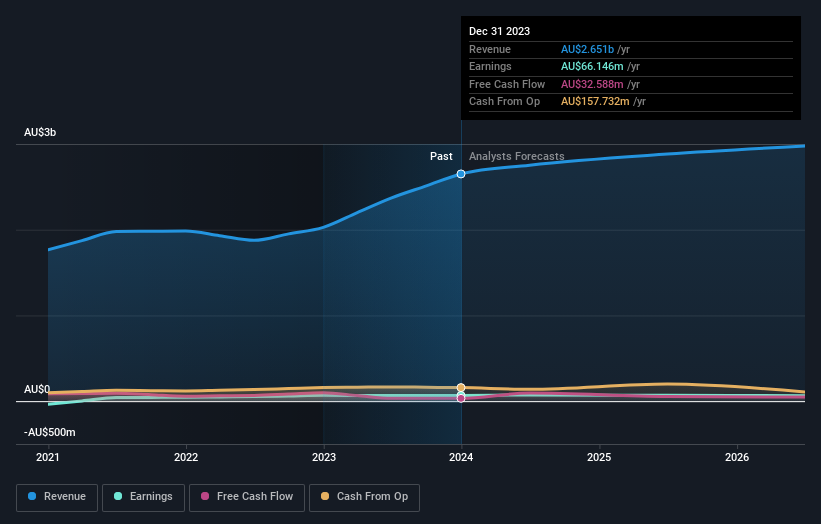Private companies account for 46% of Autosports Group Limited's (ASX:ASG) ownership, while insiders account for 28%
Key Insights
The considerable ownership by private companies in Autosports Group indicates that they collectively have a greater say in management and business strategy
A total of 5 investors have a majority stake in the company with 51% ownership
Every investor in Autosports Group Limited (ASX:ASG) should be aware of the most powerful shareholder groups. The group holding the most number of shares in the company, around 46% to be precise, is private companies. Put another way, the group faces the maximum upside potential (or downside risk).
Individual insiders, on the other hand, account for 28% of the company's stockholders. Insiders often own a large chunk of younger, smaller, companies while huge companies tend to have institutions as shareholders.
Let's take a closer look to see what the different types of shareholders can tell us about Autosports Group.
See our latest analysis for Autosports Group
What Does The Institutional Ownership Tell Us About Autosports Group?
Institutions typically measure themselves against a benchmark when reporting to their own investors, so they often become more enthusiastic about a stock once it's included in a major index. We would expect most companies to have some institutions on the register, especially if they are growing.
As you can see, institutional investors have a fair amount of stake in Autosports Group. This suggests some credibility amongst professional investors. But we can't rely on that fact alone since institutions make bad investments sometimes, just like everyone does. It is not uncommon to see a big share price drop if two large institutional investors try to sell out of a stock at the same time. So it is worth checking the past earnings trajectory of Autosports Group, (below). Of course, keep in mind that there are other factors to consider, too.
Hedge funds don't have many shares in Autosports Group. The company's largest shareholder is James Pagent, with ownership of 20%. Nicholas Pagent Family Trust is the second largest shareholder owning 11% of common stock, and Varina Trust holds about 7.7% of the company stock. In addition, we found that Nicholas Pagent, the CEO has 1.2% of the shares allocated to their name.
To make our study more interesting, we found that the top 5 shareholders control more than half of the company which implies that this group has considerable sway over the company's decision-making.
While it makes sense to study institutional ownership data for a company, it also makes sense to study analyst sentiments to know which way the wind is blowing. There are plenty of analysts covering the stock, so it might be worth seeing what they are forecasting, too.
Insider Ownership Of Autosports Group
While the precise definition of an insider can be subjective, almost everyone considers board members to be insiders. The company management answer to the board and the latter should represent the interests of shareholders. Notably, sometimes top-level managers are on the board themselves.
Insider ownership is positive when it signals leadership are thinking like the true owners of the company. However, high insider ownership can also give immense power to a small group within the company. This can be negative in some circumstances.
It seems insiders own a significant proportion of Autosports Group Limited. Insiders have a AU$137m stake in this AU$494m business. It is great to see insiders so invested in the business. It might be worth checking if those insiders have been buying recently.
General Public Ownership
The general public-- including retail investors -- own 10% stake in the company, and hence can't easily be ignored. While this group can't necessarily call the shots, it can certainly have a real influence on how the company is run.
Private Company Ownership
It seems that Private Companies own 46%, of the Autosports Group stock. Private companies may be related parties. Sometimes insiders have an interest in a public company through a holding in a private company, rather than in their own capacity as an individual. While it's hard to draw any broad stroke conclusions, it is worth noting as an area for further research.
Next Steps:
It's always worth thinking about the different groups who own shares in a company. But to understand Autosports Group better, we need to consider many other factors. Be aware that Autosports Group is showing 3 warning signs in our investment analysis , and 1 of those is a bit unpleasant...
If you would prefer discover what analysts are predicting in terms of future growth, do not miss this free report on analyst forecasts.
NB: Figures in this article are calculated using data from the last twelve months, which refer to the 12-month period ending on the last date of the month the financial statement is dated. This may not be consistent with full year annual report figures.
Have feedback on this article? Concerned about the content? Get in touch with us directly. Alternatively, email editorial-team (at) simplywallst.com.
This article by Simply Wall St is general in nature. We provide commentary based on historical data and analyst forecasts only using an unbiased methodology and our articles are not intended to be financial advice. It does not constitute a recommendation to buy or sell any stock, and does not take account of your objectives, or your financial situation. We aim to bring you long-term focused analysis driven by fundamental data. Note that our analysis may not factor in the latest price-sensitive company announcements or qualitative material. Simply Wall St has no position in any stocks mentioned.

 Yahoo Finance
Yahoo Finance 

